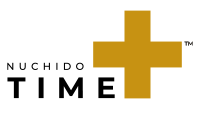The greater our understanding of age-related NAD+ decline becomes, the more it is becoming apparent that pumping more precursors (raw material) into the cell isn’t enough to fix the underlying problem.
NAD+ declines not only because of a decrease in NAD+ production but also a huge increase in NAD+ consumption - something that should be considered when choosing an NAD+ supplement.
The pathways which promote cellular defence and DNA health require large amount of NAD+ to function. As we age the demand for NAD+ by these processes increases and is, in fact, often wasted by proteins such as CD38.
Nuchido TIME+ inhibits the excretion and excessive consumption of NAD+ with EGCG and Apigenin.

Apigenin inhibits CD38
When implementing any strategy to boost NAD+ we should be looking to inhibit CD38. The good news is that there are compounds which are known to inhibit CD38.
One of these is apigenin, a polyphenol found in parsley, which is scientifically proven to inhibit CD38.

Dried parsley is known to be one of the best sources of apigenin and it is included in the Nuchido TIME+ formulation to reduce the activity of this CD38-NAD+ consuming pathway.
This is especially important because….
CD38 wastes lots of NAD+
CD38 is a protein expressed on the surface of immune cells and its expression increases as we age. Research has shown that CD38 is the largest consumer of NAD+ in mammalian cells, and this is partly because it is a very inefficient enzyme. CD38 is a catabolic enzyme which means it breaks down almost one hundred molecules of NAD+ to power its cellular reaction. Therefore, even a slight inhibition of CD38 may lead to substantial increases in NAD+.
This waste of NAD+ combined with the decreased ability to produce sufficient NAD+ means that cells are fighting over a dwindling supply. Therefore, when restoring NAD+ levels, we must look beyond just making more NAD+ but also look to prevent it from being wasted within the cell.
Green Tea inhibits NNMT to promote NAD+ recycling
Inhibiting NNMT is another aspect of our whole-systems approach. The powerful compound epigallocatechin-3-gallate (EGCG) found in green tea is proven to inhibit NNMT and therefore prevent the excretion of nicotinamide.
Nuchido TIME+ contains EGCG extracted from Green Tea Leaf for its ability to inhibit the excretion of nicotinamide (NAM), the essential raw material for NAD+ production.
By combining this with other ingredients that have the ability to enhance the salvage pathway, NAM can be recycled back into fresh NAD+ rather than being methylated and excreted from the cell.
This is beneficial to the cell because…
Excessive methylation of nicotinamide can lead to methyl donor depletion

In older cells the ability to recycle waste NAM back into fresh NAD+ is reduced, when this occurs NAM accumulates within the cell. The cell wants to maintain homeostasis (balance) so responds by increasing levels of the NNMT enzyme to methylate and remove excess NAM from the cell to reduce levels back to normal. This not only leaves less raw material available for NAD+ production, but also causes methyl donor depletion.
NNMT is another enzyme which is shown to increase with age and starts to prevent NAD+ recycling in the cell.
The cellular NAD+ pool is determined by the balance of the NAD+ synthesising enzymes and NAD+ consuming enzymes. When we are young the scale is in favour of NAD+ synthesis, supporting high levels of NAD+. As we age the scale is in favour of NAD+ consuming enzymes contributing to the decline in NAD+. To restore balance and youthfulness to our cells we must rebalance the cells, by increasing NAD+ production and recycling, but also inhibiting the breakdown and waste of NAD+ by substances such as CD38.
